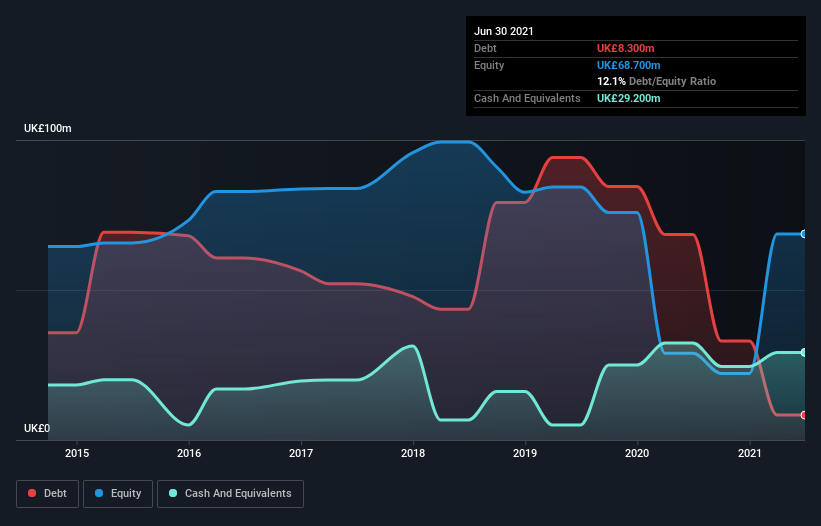We Think Staffline Group (LON:STAF) Can Stay On Top Of Its Debt
David Iben put it well when he said, 'Volatility is not a risk we care about. What we care about is avoiding the permanent loss of capital.' It's only natural to consider a company's balance sheet when you examine how risky it is, since debt is often involved when a business collapses. Importantly, Staffline Group plc (LON:STAF) does carry debt. But should shareholders be worried about its use of debt?
What Risk Does Debt Bring?
Generally speaking, debt only becomes a real problem when a company can't easily pay it off, either by raising capital or with its own cash flow. Ultimately, if the company can't fulfill its legal obligations to repay debt, shareholders could walk away with nothing. While that is not too common, we often do see indebted companies permanently diluting shareholders because lenders force them to raise capital at a distressed price. Having said that, the most common situation is where a company manages its debt reasonably well - and to its own advantage. When we think about a company's use of debt, we first look at cash and debt together.
Check out our latest analysis for Staffline Group
What Is Staffline Group's Debt?
You can click the graphic below for the historical numbers, but it shows that Staffline Group had UK£8.30m of debt in June 2021, down from UK£68.5m, one year before. But it also has UK£29.2m in cash to offset that, meaning it has UK£20.9m net cash.
How Healthy Is Staffline Group's Balance Sheet?
Zooming in on the latest balance sheet data, we can see that Staffline Group had liabilities of UK£162.7m due within 12 months and liabilities of UK£8.20m due beyond that. On the other hand, it had cash of UK£29.2m and UK£118.1m worth of receivables due within a year. So its liabilities total UK£23.6m more than the combination of its cash and short-term receivables.
This deficit isn't so bad because Staffline Group is worth UK£113.6m, and thus could probably raise enough capital to shore up its balance sheet, if the need arose. But it's clear that we should definitely closely examine whether it can manage its debt without dilution. While it does have liabilities worth noting, Staffline Group also has more cash than debt, so we're pretty confident it can manage its debt safely.
We also note that Staffline Group improved its EBIT from a last year's loss to a positive UK£900k. When analysing debt levels, the balance sheet is the obvious place to start. But it is future earnings, more than anything, that will determine Staffline Group's ability to maintain a healthy balance sheet going forward. So if you're focused on the future you can check out this free report showing analyst profit forecasts.
Finally, a business needs free cash flow to pay off debt; accounting profits just don't cut it. While Staffline Group has net cash on its balance sheet, it's still worth taking a look at its ability to convert earnings before interest and tax (EBIT) to free cash flow, to help us understand how quickly it is building (or eroding) that cash balance. Happily for any shareholders, Staffline Group actually produced more free cash flow than EBIT over the last year. There's nothing better than incoming cash when it comes to staying in your lenders' good graces.
Summing up
Although Staffline Group's balance sheet isn't particularly strong, due to the total liabilities, it is clearly positive to see that it has net cash of UK£20.9m. And it impressed us with free cash flow of UK£20m, being 2,233% of its EBIT. So we are not troubled with Staffline Group's debt use. There's no doubt that we learn most about debt from the balance sheet. However, not all investment risk resides within the balance sheet - far from it. For instance, we've identified 3 warning signs for Staffline Group (2 make us uncomfortable) you should be aware of.
If, after all that, you're more interested in a fast growing company with a rock-solid balance sheet, then check out our list of net cash growth stocks without delay.
This article by Simply Wall St is general in nature. We provide commentary based on historical data and analyst forecasts only using an unbiased methodology and our articles are not intended to be financial advice. It does not constitute a recommendation to buy or sell any stock, and does not take account of your objectives, or your financial situation. We aim to bring you long-term focused analysis driven by fundamental data. Note that our analysis may not factor in the latest price-sensitive company announcements or qualitative material. Simply Wall St has no position in any stocks mentioned.
Have feedback on this article? Concerned about the content? Get in touch with us directly. Alternatively, email editorial-team (at) simplywallst.com.


